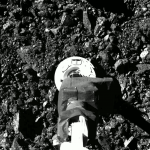After spending over seven years in space and traveling nearly 4 billion miles, a capsule containing precious asteroid samples will return to Earth on Sunday.
NASA's OSIRIS-REx spacecraft – which stands for Origins, Spectral Interpretation, Resource Identification, and Security–Regolith Explorer – launched in 2016 to conduct the agency's first mission to gather material from an asteroid in space. A capsule containing nearly 9 ounces of rocks, dust and dirt collected from an asteroid named Bennu will detach from OSIRIS-REx before its expected crash inside the Defense Department's Utah Test and Training Rage where teams from NASA and Lockheed Martin, which built the vehicle, will be awaiting its arrival.
"It's like putting a dart board at the one end of a basketball court and throwing the dart from the other end and getting a bull's-eye," OSIRIS-REx Deputy Project Manager Michael Moreau, recently told FOX Weather. "That's what we do."
WATCH MORE FOX NEWS DIGITAL ORIGINALS HERE
The yearslong mission will help scientists investigate how planets are formed, give insights into how life began and improve NASA's understanding of asteroids that could come into contact with Earth. The sample will "give generations of scientists a window into the time when the Sun and planets were forming about 4.5 billion years ago," according to NASA.
The mission will also provide information that could help protect Earth from a possible collision with Bennu. The Empire State Building-sized asteroid has a 1-in-2,700 chance of impacting Earth near the end of the 2100s, according to NASA.
The anticipated touchdown of the NASA capsule is a long time coming.
The OSIRIS-REx arrived at Bennu in 2018 and spent two years flying near and around the asteroid gathering data. After two more years of surveying the rock formation, the spacecraft made its historic landing on the asteroid's surface in 2020.
RECORD-BREAKING ASTRONAUT REVEALS HE WOULD HAVE DECLINED ASSIGNMENT IF HE HAD KNOWN THIS
After spending under a minute on the surface of Bennu while collecting a "touch and go" sample, the spacecraft returned to orbit Bennu once again. Despite a jammed door leading to the loss of some of the space dust shortly after collection, the sample is still record-breaking and above the mission requirement of two ounces.
Once the capsule carrying the sample touches down in the desert, a NASA team will bring the material to a clean room. Then the Bennu material will be brought to NASA's Johnson Space Center in Houston.
Most of the asteroid material – 70% – will be preserved for future research. NASA scientists and over 200 others worldwide will study the remaining portions.
Part of the sample will be given to the Japanese Space Exploration Agency in exchange for samples collected by the Japanese Hayabusa spacecraft, according to NASA.
OSIRIS-REx will continue on to study another asteroid, Apophis, named after a demon serpent in ancient Egyptian mythology that represented evil and chaos.
